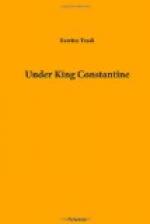“O Christalan! my son,” she answered him,
“Knighthood is in the spirit and the soul;
The deeds that show the knighthood to the world
Are but the chance and circumstance of fate;
And no knight could be truer than you proved
Yourself in self-forgetting, nor more brave
Than in foregoing knighthood for a knight.
You will be far more valiant, if you bear
This sorrow without murmur or complaint,
Than you could prove in any battle won.
The meanest varlet often wins by chance.
It needeth valour like our blessed Lord’s
To forfeit glory, and to suffer pain
Unhonoured and unknown—ah, Christalan,
True knight within my heart I hold you, dear.”
“Yea, mother mine, but now my father’s
name
Remains without fresh glory; his last prayer
And dying wishes must be unfulfilled.”
“Sweet Christalan, when you were scarce a lad,
You saw the King and thought his shining crown
His royalty, which now you know is naught
But symbol of it. Thus your father, dear,
In larger life of knowledge of the truth,
Knows that the boon he prayed was but the sign.
’Tis yours, now, to fulfil the higher prayer;
’Tis yours to gain the inward grace, and leave
The outward sign, great in its way, but less.”
“Your words are like the first flush of the
dawn
In the dark night, my mother, bringing light
To show more plain the lingering dark. O God,
It is so dark and bitter! How can you,
Yea, even you, begin to understand?
You never were a man—almost a knight.”
“But I have been a mother,” she replied
In tones so strange he roused to look at her,
And saw his sorrow’s kinship in her eyes.
He drew her arm beneath his head, and slept.
They noursled him to outward show of strength,
With care and love, the best of medicines.
A brighter day now dawned for Noel-garde
With his home-coming, notwithstanding grief.
What tales there were to tell of the great court,
Of his long service with Sir Kathanal,
To which Greane listened with quick, bated breath,
Sharing each feat and play with Christalan
As he relived it for her.
“List ye, Greane,”
He said one day with ardour of brave youth
Aglow for bravery; “I met a man
Who once had seen the great Sir Launcelot,
And told me of him. How he prayed and prayed
Within the cloister; all his deeds of war,
Of prowess, and renown, were naught to him,
Though men bowed low in goodly reverence
As he walked by; and some, ‘the foolish ones,’
The man said, yet they seem not so to me,
Stooped down and kissed the footprints that he left.
Although he wore but simple gown of serge,
With girdle at the waist, like any monk,
One felt, with passing glance, he had a power
Unconquerable in reserve, to swift
O’ercome whate’er approached him, if he
would.
And, Greane, bend down and let me speak to you:
I saw at Camelot the great white tomb
Of sweet Elaine, and not in all the court
Saw I a maiden half so fair as she.
She lies there carved in marble, pure and white;
And, by our blessed Lord, my heart is sure
That, were she living, I should love her well.”




